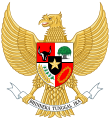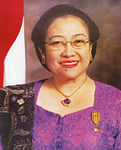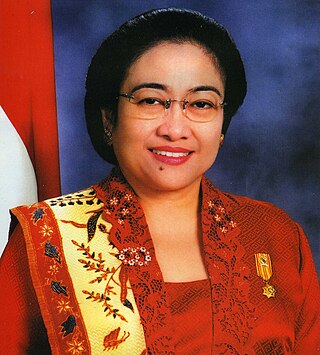
Diah Permata Megawati Setiawati Sukarnoputri is an Indonesian politician who served as the fifth president of Indonesia 2001 to 2004 and the eighth vice president under President Abdurrahman Wahid from 1999 to 2001.

Abdurrahman Wahid, more colloquially known as Gus Dur, was an Indonesian politician and Islamic religious leader who served as the fourth president of Indonesia, from his election in 1999 until he was removed from office in 2001. A long time leader within the Nahdlatul Ulama organization, he was the founder of the National Awakening Party (PKB). He was the son of Minister of Religious Affairs Wahid Hasyim, and the grandson of Nahdatul Ulama founder Hasyim Asy'ari. Due to a visual impairment caused by glaucoma, he was blind in the left eye and partially blind in his right eye. He was the first president of Indonesia to have had physical disabilities. The name Abdurrahman Wahid means "Servant of Mercy the First."

The Indonesian Democratic Party of Struggle is a centre to centre-left secular-nationalist political party in Indonesia. Since 2014, it has been the ruling and largest party in the House of Representatives (DPR), having won 110 seats in the latest election. The party is led by Megawati Sukarnoputri, who served as the president of Indonesia from 2001 to 2004.
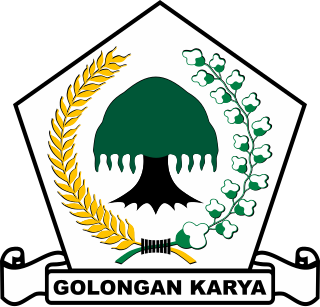
The Party of Functional Groups, often known by its abbreviation Golkar, is a centre-right big tent secular nationalist political party in Indonesia. Founded in 1964 as the Joint Secretariat of Functional Groups, it is the oldest extant political party in Indonesia. It first participated in national elections in 1971 as Functional Groups. Since 2009, it has been the second-largest party in the House of Representatives (DPR), having won 102 seats in the latest election.

The United Development Party is an Islam-based political party in Indonesia.

Legislative elections were held in on 5 April 2004 for both houses of the People's Consultative Assembly of Indonesia. This included all 550 seats in the People's Representative Council and 128 seats of the newly formed Regional Representative Council.

Presidential elections were held in Indonesia on 5 July and 20 September 2004. As no candidate won a majority in the first round, a runoff was held, in which Susilo Bambang Yudhoyono defeated Megawati Sukarnoputri and was elected president. They were the first direct presidential elections in the history of Indonesia; prior to a 2002 amendment to the Constitution of Indonesia, both the president and vice president had been elected by the People's Consultative Assembly (MPR).

Elections in Indonesia have taken place since 1955 to elect a legislature. At a national level, Indonesian people did not elect a head of state – the president – until 2004. Since then, the president is elected for a five-year term, as are the 575-member People's Representative Council, the 136-seat Regional Representative Council, in addition to provincial and municipal legislative councils.

The Post-Suharto era is the contemporary history in Indonesia, which began with the resignation of authoritarian president Suharto on 21 May 1998. Since his resignation, the country has been in a period of transition known as the Reform era. This period has been characterised by a more open political-social environment and grassroots economic improvement.

Yusril Ihza Mahendra is an Indonesian lawyer, politician and academic, who is currently serving as the leader of the Crescent Star Party (PBB) from 2015 to 2024. Previously, he served as the leader of the PBB from 1998 until 2005, Minister of Justice and Human Rights from 2004 until 2007 and 2024 until 2029, and member of the People's Representative Council from 1999 until 2009.

The president of the Republic of Indonesia is the head of state and head of government of the Republic of Indonesia. The president is the leader of the executive branch of the Indonesian government and the supreme commander of the Indonesian National Armed Forces and the Indonesian National Police. Since 2004, the president and vice president have been directly elected to a five-year term, once renewable, allowing for a maximum of 10 years in office. The new president of Indonesia is Prabowo Subianto, who assumed office on 20 October 2024.

Presidential elections were held in Indonesia on 8 July 2009. The elections returned a president and vice president for the 2009–2014 term. Incumbent President Susilo Bambang Yudhoyono, elected with a 20% margin in the 2004 election, sought a second term against former President Megawati Sukarnoputri in a rematch of the 2004 election, as well as incumbent Vice President Jusuf Kalla. Securing a majority of the votes in a landslide victory in the first round, Yudhoyono was re-elected without the need to proceed to a second round. Yudhoyono was officially declared the victor of the election on 23 July 2009, by the General Election Commission (KPU). At the time of his re-election victory, Yudhoyono, with nearly 74 million votes in his favour, held the record for the highest number of votes for a single person in any democratic election in history, surpassing Barack Obama's total of 69.5 million votes in the 2008 United States presidential election. His record was surpassed by his respective successors Joko Widodo who won more than 85 million votes in 2019 and Prabowo Subianto who won more than 96 million votes in 2024.

Early legislative elections were held in Indonesia on 7 June 1999. They were the first elections since the fall of Suharto and end of the New Order, the first free elections in Indonesia since 1955, and the first and only free legislative election held in East Timor during Indonesian provincehood. With the ending of restrictions on political activity following the fall of Suharto, a total of 48 parties contested the 462 seats up for election in the People's Representative Council. A further 38 seats were reserved for members of the armed forces.
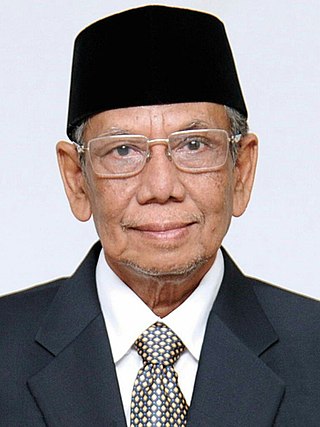
Achmad Hasyim Muzadi was an Indonesian Islamic scholar and cleric who served as chairman of the Nahdlatul Ulama, from 1999 to 2010. The founder and director of the Al-Hikam Islamic boarding school, he was a proponent of moderate Islam, which he defined as being neither radical nor liberal, and criticized both Islamic fundamentalism and Islamic liberalism. Hasyim was the vice presidential running mate of President Megawati Sukarnoputri in the 2004 Indonesian presidential election, though the ticket was defeated in a runoff. He subsequently served in the Presidential Advisory Council from 2015 until his death.

The Memorandum of the President of the Republic of Indonesia of 23 July 2001 was issued by the fourth President of Indonesia, Abdurrahman Wahid, at the climax of his standoff with the People's Consultative Assembly (MPR) and other sections of society, including the Indonesian National Armed Forces (TNI).
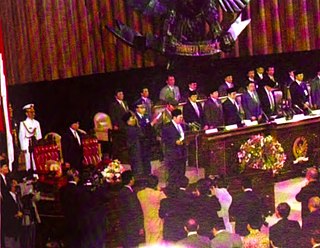
The inauguration of Abdurrahman Wahid as the fourth president of Indonesia took place on Wednesday, 20 October 1999 at the Parliamentary Complex, Jakarta. The ceremony marked the commencement of Wahid's only term as president.

Abdurrahman Wahid, also known as Gus Dur, was impeached and dismissed as the fourth president of Indonesia on 23 July 2001, after he issued a decree to dissolve the Indonesian legislature and suspend the Golkar Party.

The inauguration of Megawati Sukarnoputri as the fifth president of Indonesia took place on Monday, 23 July 2001. The ceremony was held at the Parliamentary Complex shortly after the MPR vote her to become president, the ceremony also marked the end of Abdurrahman Wahid's term as president following his impeachment after the presidential decree on the same day.

On Wednesday, 20 October 2004, President-elect Susilo Bambang Yudhoyono was inaugurated as the 6th president of Indonesia. Yudhoyono was the first democratically direct-elected president of Indonesia, after previous presidents was elected by the People's Consultative Assembly.
The People's Consultative Assembly, the bicameral legislature of Indonesia, passed a series of resolutions of the People's Consultative Assembly or TAP MPR throughout the 1960s, to the very last issued in 2003.


